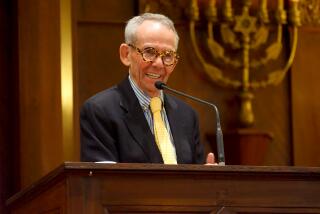SOCIAL DISEASE by Paul Rudnick (Knopf: $14.95; 193 pp.)
Here’s the first line of Paul Rudnick’s first novel, “Social Disease”: “Brucie, we gotta get in. I told Joyce we was gonna get in.” This kind of dialogue sets the tone for “Social Disease,” which is, as far as I can tell, 193 pages of comic strip without the artwork necessary to make that literary genre complete. While his dialogue, descriptions and events are often very funny, and generally well-written, Rudnick’s bizarre, super-parodic, highly episodic examination of the New York club scene (“The Fabulous Club de” is where Brucie and Joyce have to go) reveals the author’s aggressive refusal to include the kind of characters, story or plot required to make this work a “novel” in any sense of the word. “Social Disease” needs comic-strip panels the way Brucie and Joyce need to get into the club--desperately. The work is parody with no basis in reality, which makes it no parody at all.
“No basis in reality?” I know what you’re thinking: Just stop the limo right here . Rudnick’s “Fabulous Club de,” complete with velvet ropes to keep out the screaming riff-raff from New Jersey, is obviously based on the old Studio 54, or the current Palladium, which is as real as Kenny Rogers’ solid jade commode. Come on , you’re thinking, get with the program. Does the name Robin Leach mean anything to you? Plus, in Manhattan these days, you’ve got your Area. You’ve got your Xenon. You’ve got, in short, countless Manhattan clubs one would think could provide novelist Rudnick with a solid mother lode of reality. (And not just New York: If he had made even an attempt to attract sympathy through Scene or Character, Rudnick could have sold many copies of his book just to people who’ve been turned away from Helena’s, or dentists from the wrong side of Ventura Boulevard who’ve had to wait hours for their properly reserved tables at Los Angeles places like Spago, Le Dome or Wave.) In television, they call it “narrow-casting.” In publishing, they call it “bad fiction.”
Guy Huber is Rudnick’s semi-repellent protagonist ( semi- is as good as it gets), who’s doing his damnedest to maintain a “Fabulous Club de” life style--regular attendance at the Club, good wardrobe at all times, plenty of naps--all on a trust fund set up by his parents. We get the feeling Guy was doing OK in the cash flow department until about a week ago, when he married Venice, an extremely hot number and “Fabulous Club de” regular. Venice is purely repellent. (Look up repellent in the dictionary and you’ll see her picture. Look up Venice in the dictionary and you’ll see the exact same girl, snorting cocaine in the back of a gondola after writing a premeditated bad check on her best friend’s account to some vacationing drug dealer.)
Guy’s family wealth is “shameful(ly)” derived from “domestic champagne (Cordon Huber) . . . primarily available in six packs.” Rudnick writes, “The Hubers never served the home brew, and Guy remembered his mother stroking his forehead at bedtime and murmuring, ‘At least we’re not a beer.’ ”
Although Robin Leach would only admit that Paul Rudnick is basically a good writer and a funny guy if the movie rights to “Social Disease” were auctioned off one well-catered afternoon at the Palladium itself for about $56 million, there’s no getting around Rudnick’s solid talent. A couple of examples: “A wife and a homosexual are practically the true Manhattan marriage. If a pair somehow mated, their offspring would be an appointment book.”
And: “Guy was not willfully spoiled, he was spoiled as a leaf is green, organically, tenderly.”
“Social Disease” follows Guy, Venice and Licky (their homosexual, self-appointed maid) through some rather tedious episodes that revolve around the equally tedious “Fabulous Club de.” Then it ends.
The irony is that Paul Rudnick is a better writer than Jay McInerney who wrote the seriously received “Bright Lights, Big City.” Rudnick can also write circles around Brett Easton Ellis, who wrote “Less Than Zero,” which was . Here’s hoping that next time out Rudnick checks some of his glibness at a locker at Grand Central and writes about characters we can care about.
More to Read
Sign up for our Book Club newsletter
Get the latest news, events and more from the Los Angeles Times Book Club, and help us get L.A. reading and talking.
You may occasionally receive promotional content from the Los Angeles Times.








